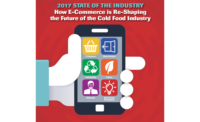Understanding your customer is critical no matter what business you’re in. And, refrigerated and frozen foods manufacturers are no different. That’s because the cold food business is facing an unprecedented level of disruption.
For instance, Amazon, the poster child of this upheaval, is coming after its competitors in food with characteristic boldness. At the end of August, the e-commerce giant announced the initial strategy for its FTC-approved $13.7 billion acquisition of Whole Foods Market. Slashing prices was the first order of business. Jeff Bezos, chief executive officer of Amazon, also aims to integrate Amazon Prime into Whole Foods’ point-of-sale system, giving Prime members special savings and in-store benefits at Whole Foods’ 460 locations and making Whole Foods’ private label products available on Amazon.com.
This is just the beginning.
Today’s food marketplace is a bit like the warring factions on HBO’s “Game of Thrones.” All of the parties in this channel-blurred landscape—drugstores, c-stores, dollar stores, grocers, e-tailers, discounters, you name it—are locked in bloody, hand-to-hand combat.
But, what if I told you that the likes of Kroger, Trader Joe’s, Costco, Aldi, Lidl, HEB and Wegmans, to name a few, have already found a sensible way to fight back—a strategy that happens to require working closely with manufacturers as capable contributors?
All of the aforementioned players share something in common—a sharp focus on private label. Statistics show that when food retailers’ private label penetration is high, their customer loyalty is too. In an earlier era, when competition was limited and channels fixed, price was a major driver of loyalty. Today, though, it is hard to be loyal to pricing. You can always find a better deal on a frozen entrée from the c-store in your neighborhood to the Amazon Dash button on your phone. In other words, the timeworn combination of offering national brands at a lower price is on its way to becoming table stakes rather than a viable strategy.
And, this is where it is so critical for both manufacturers and food retailers to have a forward-thinking vision about the role of private label. While the mindset on private label has shifted tremendously in recent years, large segments of the food business continue to treat store brands merely as the value play in a category. In this traditional way of thinking, a store brand is just there to drive margin, as an alternative to its national brand counterpart. But, that’s not how decision makers at Wegmans, Kroger, Costco or HEB see private label. These chains have all ramped up the sophistication and quality of their store brands. Meanwhile, for operators like Trader Joe’s, Aldi and Lidl, private label is a central focus.
This latter group, in fact, trounces traditional grocers in terms of extending brands deeper into the perimeter. The offering at these stores features more diversity and creativity in refrigerated and frozen items. If you need some interesting and tasty hors d’oeuvres for a cocktail party, you’ll find scant offerings at many traditional grocery stores, but plenty to choose from at Trader Joe’s.
For now at least, those specific Trader Joe’s hors d’oeuvres are not available on the Amazon app. This is precisely why manufacturers need to clearly demonstrate that they have a strong commitment to, and see a definitive role for, store brands. The message should be that the manufacturer and the retailer are on the same page with respect to seeing private label as a strong way to differentiate and compete.
The disruptors will keep getting better. Manufacturers and retailers need to collaborate to keep moving forward on innovation, product development and creative packaging, all while continuing to offer strong value and quality. Rapid change must also be built into the operational model for store brands. In the years to come, private label items at many chains will come and go more quickly than in the past.
Manufacturers of refrigerated and frozen foods will need to continue to refine their capabilities in much the same way. The proliferation of Limoncello products at Stop & Shop is a case in point. Billed as “uniquely sweet, lemon-inspired creations,” they include ice cream, candies, ice cream sandwiches, marmalade, cookies, salad dressing and more. Manufacturers need to be able to pack products like this, get them on store shelves for a couple of months and then pull them in lieu of a creative new replacement. It isn’t easy, but it’s the way of the future.
Disruption is forcing grocers, drugstores and other chains to think harder about using private label to win shoppers’ hearts and minds. The key insight here is that store brands are actually a powerful marketing tool. Because of the millions of visual and tactile consumer impressions they represent, they are a medium of mass communication that can make all the difference when it comes to customer loyalty. With the right orientation, manufacturers can help more of these customers see the light about private label, and stave off the attack of the disruptors.






